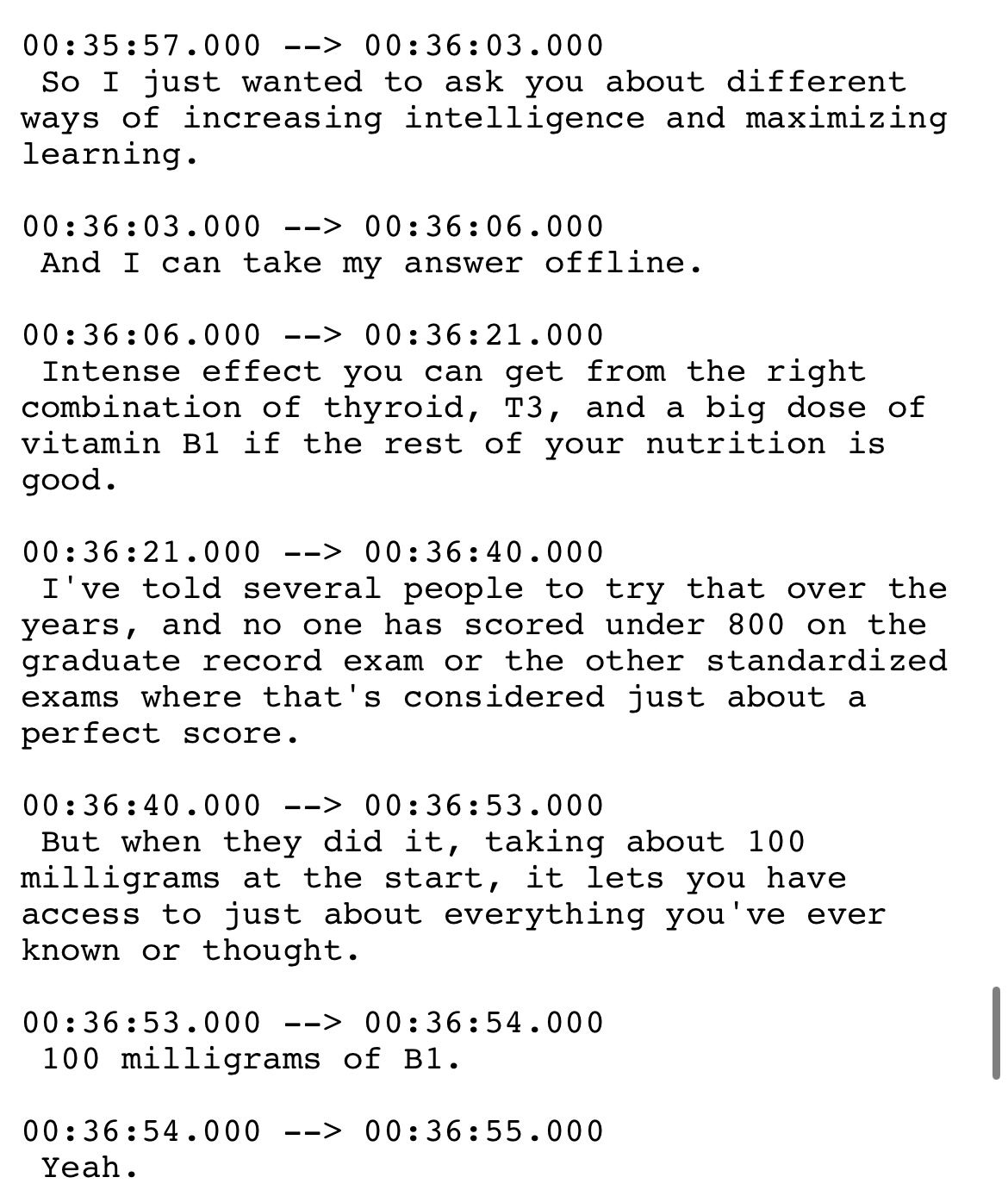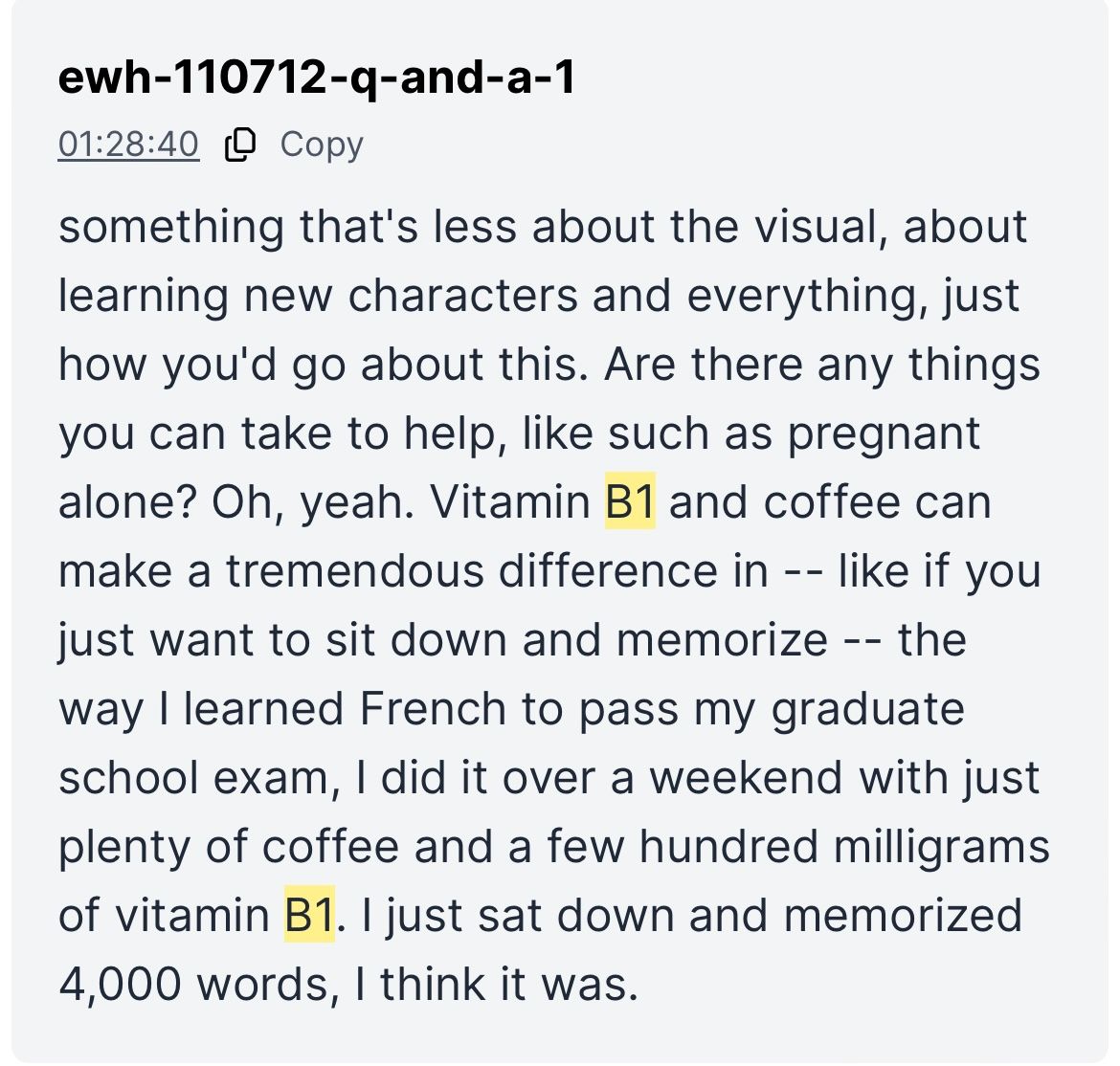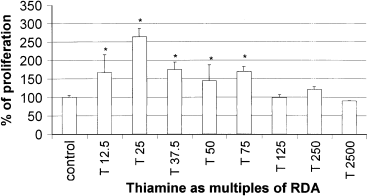B1 thiamine for memory
-


I’ve found excerpts of Ray Peat talking about vitamine B1 for memory and learning. I have a few questions:
- How long can high B1 doses be sustained (e.g can I take it for an exam period ~1 month, or will I build a “tolerance”)
- Thiamine in the tissue is <40mg, why would a high dose make a difference? Aren’t B1 vitamines water soluble?
- Does anyone have experience with this, if so tell us your experience and doses
-
@stingraypeat On occasion I’ll take 100mg B1 with coffee and sugar and I feel extremely mentally alert. It’s water soluble so I don’t really worry about tolerance or overdose, but I don’t think I’ve taken it on multiple consecutive days.
-
@brad is this effect as profound as Peat made it out to be? Does it have a noticeable effect over just coffee and sugar?
-
@mostlylurking
-
@stingraypeat Yes it’s definitely better than just coffee and milk and sugar.
-
@stingraypeat said in B1 thiamine for memory:
I’ve found excerpts of Ray Peat talking about vitamine B1 for memory and learning. I have a few questions:
How long can high B1 doses be sustained (e.g can I take it for an exam period ~1 month, or will I build a “tolerance”) Thiamine in the tissue is <40mg, why would a high dose make a difference? Aren’t B1 vitamines water soluble? Does anyone have experience with this, if so tell us your experience and doses"High" B1 doses mean different things to different people and vary a lot depending on the type of B1 used and the person's ability to absorb and utilize it. Because oral thiamine hcl has extremely poor absorption rate in the intestine, a 100mg dose of it would be considered a "low" dose. 100mgs of TTFD would be considered a lot higher dose because it has no problems getting absorbed and also getting into the cells. There is also sublingual thiamine mononitrate which is supposed to be as effective as a 100mg injection of thiamine hcl.
Because all of these thiamines are water soluble, they only stay in the body for a few hours. A little of it might get stored in the liver for a longer period.
The thing that I don't understand about this idea of taking thiamine with coffee and sugar is that coffee blocks thiamine function and sugar uses it up.
I take high dose thiamine hcl; 1gram, twice a day, for the past 3 years. I cannot tolerate any coffee and gave it up in 2020.
If you want to experiment with this idea of thiamine improving memory and brain function, I think possibly the sublingual form would be a reasonable choice as it does get into the brain. But TTFD gets into the brain too. It is believed that oral thiamine hcl only crosses the blood brain barrier if the system is flooded with a lot of it (per Dr. Costantini). Some people have found that taking the sublingual every other day is sufficient to treat their Parkinson's Disease. The initial reaction to it might settle down over several days' dosing, but the effect on the brain would still be there.
-
I got perfect memory recall when I took 200mg. I remember going back to my desk and suddenly remembering a name I couldn’t recall previously.
Have you ever tried thiamine topically? @mostlylurking
The idealabs formulation Energin can be used on the skin. I don’t rely on it for my thiamine but I do use it as a b complex. -
@Peatly said in B1 thiamine for memory:
I got perfect memory recall when I took 200mg. I remember going back to my desk and suddenly remembering a name I couldn’t recall previously.
Which thiamine did you try?
Have you ever tried thiamine topically? @mostlylurking
The idealabs formulation Energin can be used on the skin. I don’t rely on it for my thiamine but I do use it as a b complex.No, I've never tried a topical thiamine. I just dissolve it into water and glug it down.
I want to add that the 100mg sublingual thiamine can be easily broken in half (or fourths) if anyone wants to experiment with a tiny dose of it.
-
@mostlylurking It was thiamine HCL powder. I've been on thiamine for years, all forms but never more than 50mg at a time.
I use a liquid thiamine pyrophosphate which works really well sublingually
-
@mostlylurking Another researcher I have followed advised the best form of B1 is Benfotiamine.
-
@DanW said in B1 thiamine for memory:
@mostlylurking Another researcher I have followed advised the best form of B1 is Benfotiamine.
Elliot Overton, who normally promotes TTFD has said benfotiamine is his next best choice. Many people react badly to TTFD (I did) so it's good to have an alternate choice.
I chose to stick with the old fashioned thiamine hcl because it has a very good and very long safety record and I tolerate it very well. Dr. Costantini always used it for his Parkinson's Disease patients.
-
@Peatly said in B1 thiamine for memory:
@mostlylurking It was thiamine HCL powder. I've been on thiamine for years, all forms but never more than 50mg at a time.
I use a liquid thiamine pyrophosphate which works really well sublingually
Do you have a link to the liquid thiamine pyrophosphate? I'm curious.
The only negative that I know of regarding smaller doses of thiamine is that small doses tend to be carcinogenic. They base what is considered a "small" dose off of the RDA X 25? The RDA is set ridiculously low, I think less than 2mg/day for women. This was for thiamine hcl (I think). When a study just says "thiamine" they are referring to thiamine hcl (I think).
The role of thiamine in cancer: possible genetic and cellular signaling mechanisms
Linking vitamin B1 with cancer cell metabolism
The effect of thiamine supplementation on tumour proliferation. A metabolic control analysis study
There is a study (somewhere) that provides the breakdown of what is considered low dose, medium dose, and high dose for thiamine hcl and the effect of the size of the dose on cancer. I can't find it now, sorry. I posted info about this on the Ray Peat Forum sometime within the past year.
maybe it's this one?
High Dose Vitamin B1 Reduces Proliferation in Cancer Cell Lines Analogous to Dichloroacetate
Sorry, I'm too tired to read the study right now. -
@mostlylurking
This is the one I use Metabolics Thiamine PyrophosphateThank you for those links - This full article you linked it includes the doses used in the experiment. I don't know how this will translate to human studies.
https://febs.onlinelibrary.wiley.com/doi/full/10.1046/j.1432-1327.2001.02329.x
From the article
To examine the effect of thiamine administration on tumour cell proliferation, we treated mice daily with 0, 12.5, 25, 37.5, 50, 75, 125, 250, and 2500 times the RDA subcutaneous, starting on day 4 after inoculation of the tumour until 8 days after tumour implantation. Treatment with thiamine was started on day 4 after implantation of the tumour because, as we previously reported, the Ehrlich's tumour is already highly deficient in thiamine at this time, there being 42% of apo-TK inside the tumour [19].
Results in Fig. 1 show that at moderate doses (12.5, 25, 37.5 times the RDA) thiamine acts as a vitamin, intensifiying tumour growth through transketolase activation. With respect to untreated mice, a maximum increase in tumour cell number of 164% was obtained at a thiamine dose of 25 times the RDA. Interestingly, higher doses of thiamine did not produce such a dramatic change in final tumour cell number when compared with control animals. Furthermore, an overdose of 2500 times the RDA of thiamine results in an inhibition of 10% on tumour proliferation. This inhibitory effect of thiamine overdoses suggests that high doses of the vitamin could benefit the organism by inhibiting tumour growth. The possible inhibitory effect on tumour growth, resulting from the administration of high doses of thiamine before tumour inoculation, is further considered below.

-
@Peatly Thank you for reading and finding the info. Unfortunately, it's not the research article that succinctly talked about the effect of doses of thiamine for people that I was trying to find. I'll look for it again and will post the link if I'm successful.
Edit:
Maybe I found it?
https://www.hormonesmatter.com/warburg-effect-cancer/
"Thiamine supplementation between 12.5 and 250 times the recommended dietary allowance (RDA for mice) stimulated the tumors. Doses 2500 times the RDA resulted in 10% inhibition of tumor growth (3). This inhibitory effect of exceedingly high doses of thiamine is unexplained and certainly merits further study." -
it works exceptionally well for studying and retention, it is essentially all i utilize as a full-time engineering student to ensure my time spent studying is productive.
i will drink coffee throughout the morning / early afternoon then i will use 50mg allithiamine when its time to start reading. if im still going after several hours i will take another dose.
i find it is important to have a steady supply of glucose during this block, i don't like snacking / grazing so what i will do is increase the frequency of my meals during this block, and maybe within this block a couple times i will have servings of fresh fruit. i believe it is essential to feed the b1 with adequate carbohydrates. my meals during this block are simply jasmine rice and lean meat cooked in coconut oil, fruits will either be citrus fruits or berries.
during this block i might eat a meal as frequently as once every hour or 1.5 hours just to ensure i have steady glucose. i will also use red light during this block as well for brief periods.
it is better than just coffee + sugar, absolutely. i can also attest to the fact that during this block and whenever i utilize this strategy, my gastric emptying rate is noticeably faster, which is another reason i suspect the b1 helps with cognition. the digestive benefits are not to be overlooked.
remember, you want to "feed" the b1 with proper carbohydrates, keep that in mind. don't do what people often do while studying and go in a stressed state neglecting eating, the improved retention from b1 will make up for the time spent eating or taking care of yourself. its the quality vs quantity that matters.
you don't need to go super high dose with allithiamine, i notice an improvement that lasts a few hours with just 50mg.